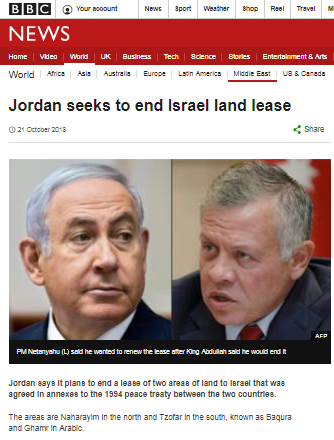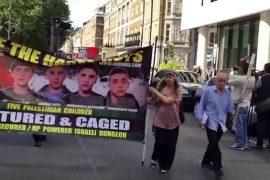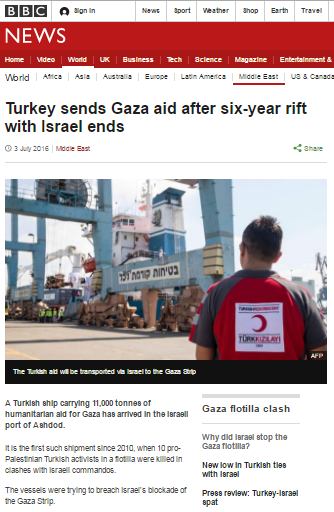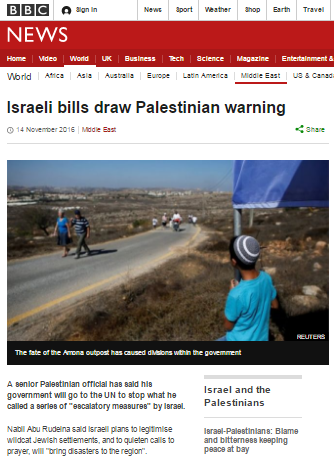On October 21st the BBC News website ran a report titled “Jordan seeks to end Israel land lease” which relates to the Jordanian king’s announcement on the same day that he will not renew two annexes of the 1994 peace treaty between Israel and Jordan concerning territory leased to Israel.
“Jordan says it plans to end a lease of two areas of land to Israel that was agreed in annexes to the 1994 peace treaty between the two countries.
The areas are Naharayim in the north and Tzofar in the south, known as Baqura and Ghamr in Arabic.
The lease governing them was for 25 years and had been due for renewal. […]
Under the terms of the annex to the peace deal, the lease would be extended automatically unless one party gave notice a year before the lease ended, leading to talks on the matter.”
While the first part of the article gives readers a reasonable account of the story, the later part – under the sub-heading “Why would Jordan want to end the lease?” – provides an incomplete account of the story’s background.
“King Abdullah has been under pressure from Jordanian MPs and the Jordanian public not to renew the lease for the two areas. Eighty-seven Jordanian MPs have signed a petition urging an end to the lease.
Last Friday protesters in the Jordanian capital Amman called for the lease to be ended and campaigns have also taken place on social media.
It follows recent strains in the relationship between Jordan and Israel over issues including the status of Jerusalem and the lack of progress on a peace deal between Israel and the Palestinians.”
The BBC chose not to inform its audiences that – as the Jerusalem Post reports – there are elements in Jordan that would like to see an end to more than just the lease on the two specific areas of land.
“In very general terms, it’s fair to say that the 1994 peace agreement did not filter down to Jordanian masses. The Jordanians might already be drinking Israeli water, are scheduled to be heating their homes with Israeli natural gas in 2020, and benefit in numerous ways from security cooperation with Israel, but, for the most part, they don’t like Israel.
And this is something that King Abdullah II has to take into account.
Jordan’s announcement on Sunday regarding the Naharayim (Baqura) area near the Kinneret and part of Zofar (al Ghamar), in the Arava, did not knock anyone off their chair in Jerusalem. There has been talk for months inside Jordan of the need to regain those two areas. There have been debates in parliament, and even protests on the streets – much of it led by Islamic elements inside the Hashemite Kingdom.
Abdullah is in vice. While he needs the peace treaty with Israel for the security of his regime, he has domestic Islamic elements to deal with and at times placate.”
The Times of Israel adds:
“Additionally, an economic crisis that struck the kingdom over the past year may also have pushed Abdullah not to renew this portion of the treaty, in an effort to appease hardliners and prevent a potential coup, veteran regional analyst Ehud Yaari told Hadashot news on Sunday night.
Jordan has struggled with a sluggish economy, including rising unemployment, in the wake of regional conflicts, including in neighboring Syria and Iraq. Earlier this year, largely peaceful demonstrations, which led to a change of prime ministers, erupted over rising prices and proposed legislation to increase income tax, in line with IMF-driven austerity measures.”
Obviously internal Jordanian affairs – about which BBC audiences hear comparatively little – are no less relevant to the understanding of the background to this story than “the status of Jerusalem and the lack of progress on a peace deal between Israel and the Palestinians”. BBC audiences, however, were denied that information.
Related Articles:
Superficial BBC News report on Naharayim killer’s release
BBC framing excludes important aspects of Amman embassy story
BBC’s Yolande Knell promotes Muslim Brotherhood messaging




